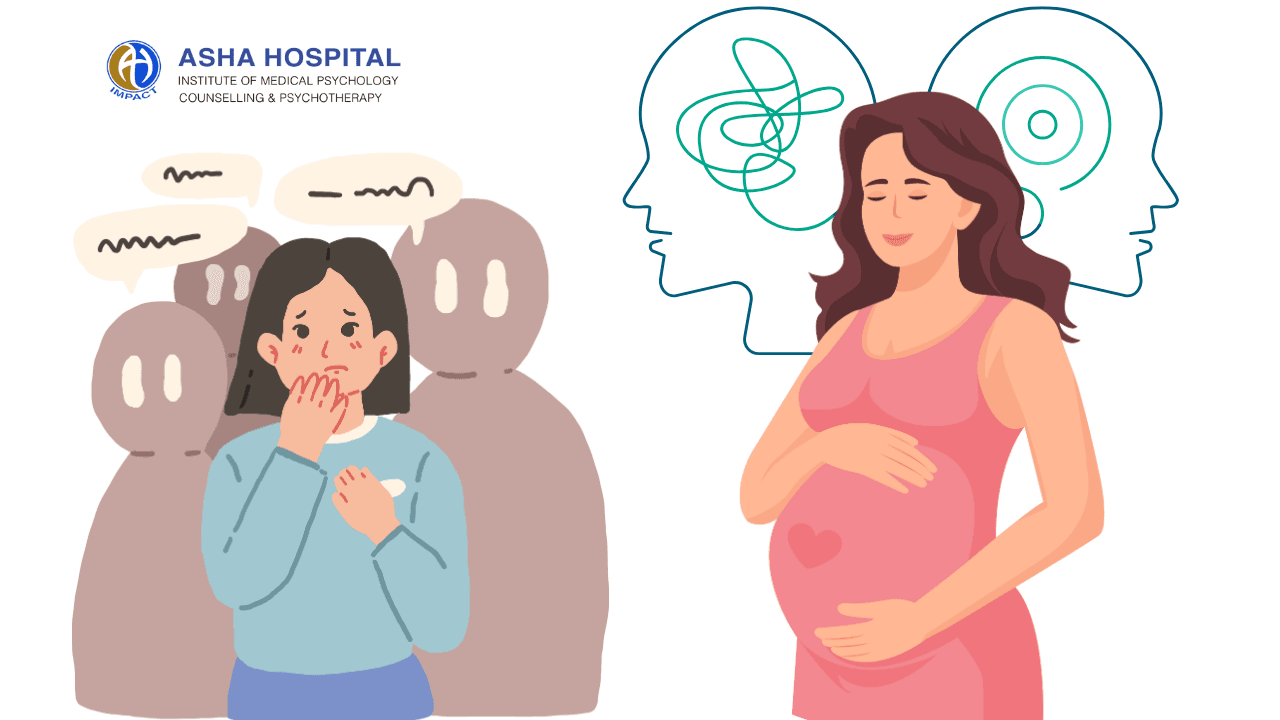Bipolar disorder is a mood disorder, with biological underpinnings
Bipolar disorder is mood disorder, as the name suggests, it has two poles i.e. mania and depressive episodes. The depressive episodes of bipolar disorder are similar to any other depressive illnesses. Manic episodes are quite intense and disturbing. Many women get diagnosed for the first time with bipolar disorder during pregnancy and postpartum.
Mood disorders are illnesses that affect a person’s ability to experience normal mood states. The mood disturbances come in episodes, may cause significant social and occupational dysfunction. They are illnesses occurring due to several factors, majorly biological disturbances involving brain chemical and receptor sensitivities. Emotional stressors and substance abuse can trigger the occurrence of these changes. Sometimes, there will not be any visible trigger to cause these changes.

Depressive episodes in Bipolar disorder cannot be differentiated from any other depressive disorders of similar severity
Bipolar depressive episodes:
- Depressed mood most of the day, nearly every day, for 2 weeks or longer
- Loss of interest or pleasure in activities that the person usually enjoys.
- Recurrent thoughts of harm to the unborn/ new born baby
- Recurrent thoughts of death or suicide.
- Fatigue or lack of energy
- Anxiety or feeling slowed down
- Feelings of guilt or worthlessness
- Difficulty concentrating
- Trouble sleeping or sleeping too much
- Changes in appetite
Bipolar depressive episodes may also present with psychotic symptoms with delusions and hallucinations.
Manic episodes can be disruptive
- Elated or irritable mood
- Rapid speech
- Little need for sleep
- Racing thoughts, trouble concentrating
- Continuous high energy
- Overconfidence
- Delusions (often grandiose, but including paranoid)
- Impulsiveness, poor judgment, distractability
- Grandiose thoughts, inflated sense of self-importance
- In the most severe cases, delusions and hallucinations
Risk for next episode lies in your past and genetic history
Previous episodes of bipolar disorder in woman may increase the risk of future episodes, especially during pregnancy and postpartum. A positive family history of mood disorders, substance abuse may also increase the risk of bipolar disorder during these vulnerable periods.Non compliance with medications is an important risk factor.
Sleep deprivation can be a risk factor
One other factor which may contribute to this heightened risk for relapse is that many women with bipolar disorder are very sensitive to sleep deprivation. We recommend that all women, especially those with bipolar disorder, attempt to protect their sleep, by relying on their partners or other people for nighttime feedings, with the goal of getting at least one longer period of uninterrupted sleep each night (ideally 4-6 hours).
Managing bipolar disorder in pregnancy and postpartum can be challenging to you and your doctor
Management of bipolar disorder otherwise is very tasking and challenging, it gets more challenging to manage it in a pregnant woman and while breast feeding. Research available is limited; treatment with multiple medications and modalities becomes inevitable.
Antipsychotics and mod stabilizers are the mainstay of treatment
Antipsychotics and mood stabilizers are used during the manic episodes, while antidepressants may be used under the cover of an antipsychotic and or mood stabilizer to manage a depressive episode. The available research on the safety of mood stabilizers and antipsychotics is minimal.
Untreated bipolar disorder is not without risks!
At the same time, untreated bipolar disorder has serious potential risks for mother and fetus, since it may lead to poor nutrition, smoking, drinking, suicidal behavior, prolonged or premature labor, and low birth weights.
Use of antipsychotics in pregnancy is relatively safe, risks and benefits need to be discussed.
Reports of major congenital malformations in the fetus with the use of antipsychotics during pregnancy have given mixed results. The relative risk of the fetus born with congenital malformation might be slightly higher for those who use antipsychotics during pregnancy but the absolute risk gets minimized when we compare the risks between women with bipolar disorder not on medication and women with bipolar disorder treated with medication. In deciding whether a woman should use antipsychotic medication while pregnant or trying to become pregnant, a woman and her doctor have to balance the possible risks of the medication against the severity of the disorder.
Mood stabilizers is the choice when no option available, especially if you responded well with them in past
The use of mood stabilizers such as lithium and sodium valproate in management of bipolar disorder during pregnancy is laded with many obstacles. Risk of congenital malformations are associated positively with the use of sodium valproate and lithium. Its use must not be restricted in case of clear benefit to the woman with bipolar disorder
Details such as previous response with these medications, response with other relatively safer medications have to be studied in detail and with a close observation of the fetal development using the advanced techniques of ultrasonography and colloboratve care model with other concerned specialists is mandatory for a successful outcome.
Electro convulsive therapy can be considered for the management of bipolar disorders during pregnancy and in postpartum, which is an effective alternative and adjuvant to the existing medications
Infant needs to be observed closely if breastfeeding given.
Given the many benefits of breast feeding, some women may wish to continue breast feeding their infants while receiving psychiatric medications. Some amount of the drug is invariably excreted in the breast milk therefore exposing the infant.
With the available information on antipsychotics and mood stabilizers while breast feeding, serious adverse events related to these medications have not been reported. However, there have been reports of milder adverse events such as jitteriness, irritability, excessive sedation, lethargy, slowed motor movements, excessive crying and sleep disturbances in infants exposed to antipsychotics and mood stabilizers.
Why Choose Asha Women’s Mental Health Clinic for Perinatal Bipolar Disorder Care?
At Asha Women’s Mental Health Clinic in Hyderabad, we understand the unique challenges of bipolar disorder during pregnancy and after childbirth. Our expert team provides safe and personalized care to help mothers manage mood changes, depression, and mania during this important time.
We offer accurate diagnosis, safe treatment options, and emotional support to ensure both mother and baby stay healthy. With caring doctors, private sessions, and regular follow-ups, we help you feel better and build a strong bond with your child.
Choose Asha for trusted mental health care during and after pregnancy.
Asha Womens Mental Health Clinic – Visit HereFAQ – Womens Mental Health Perinatal Bipolar Disorder
What is perinatal bipolar disorder?
Perinatal bipolar disorder refers to bipolar disorder that occurs during pregnancy or the postpartum period. It involves episodes of depression and mania, which can significantly impact a woman’s ability to function and care for her baby.Many women are diagnosed for the first time during this period.
What are the symptoms of perinatal bipolar disorder?
Symptoms include:
- Depressive episodes: Persistent sadness, loss of interest, fatigue, feelings of worthlessness.
- Manic episodes: Elevated mood, increased energy, decreased need for sleep, impulsive behavior.
These mood swings can be severe and may require medical intervention.
How is perinatal bipolar disorder diagnosed?
Diagnosis involves a comprehensive psychiatric evaluation, considering the patient’s history, symptoms, and any family history of mood disorders. It’s crucial to differentiate bipolar disorder from other perinatal mood disorders for effective treatment.
What treatments are available for perinatal bipolar disorder?
Treatment options include:
- Medication: Mood stabilizers and antipsychotics, prescribed with caution during pregnancy and breastfeeding.
- Therapy: Cognitive-behavioral therapy (CBT) and other psychotherapies.
- Hospitalization: In severe cases, inpatient care may be necessary to ensure the safety of both mother and baby.
Why is early intervention important in perinatal bipolar disorder?
Early diagnosis and treatment are vital to prevent complications such as postpartum psychosis, impaired mother-infant bonding, and increased risk of suicide. Timely intervention can lead to better outcomes for both mother and child.


